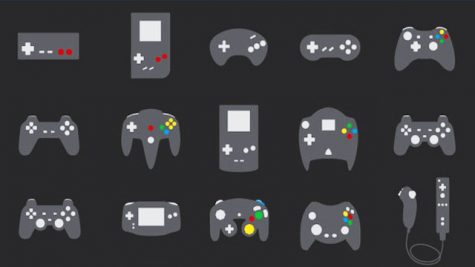Let Us Play Video Games In Class!

You are playing as Kirby, fighting against Link, Mario, and Fox in “Super Smash Bros. Melee on the Kirby Dreamland Stage”. Everyone has one life left. Mario uses his hammer power up and knocks Link off of the stage. Fox uses his fast dodging reflexes to reflect Mario’s attack, and Mario falls off the map.
Fox tries to defeat you, but you kick him multiple times in a row to raise his percentage of losing. He uses his weapon to increase your percentage. He almost kicks you off until you fly up, and he falls to his misery. “GAME! Congratulations! This game’s winner is…KIRBY!”
Video games such as Super Smash Bros. Melee are very popular amongst students, but could they be beneficial in a school setting?
Perspective and strategy are great qualities in games that catch freshman Ashley Delgado’s eye. She would add games specifically in language arts and math classes to involve students to participate. She likes how games teach a valuable lesson in an original way.
The Positive Feedback of Games 
If Abigaelle Alexandre, freshman of MHS, was an instructor herself, she would authorize games in class “If that brings the students’ attention more towards the class.” She said, “I wouldn’t mind it if they played games, but it has to be appropriate for the classroom. It can’t be just for fun.”
Amanda Manuel, a freshman, believes playing games benefits the learning environment because they are ways for a child to “absorb the given material”. The “stimulation of a child” during an educational game is what Amanda supports. On the other hand, any games that incorporate “critical competition” should not be allowed within the school community because they influence anti-social qualities.
Freshman Jasmine Arellano also believes that games are educational because “they create an excitement for students.” She believes that “games make students more excited to learn the topic.” She remembers learning how to play Starfall and fascinating herself with this website when she was younger. If Jasmine were a teacher and she saw her students improving, explorational and thinking games could be played occasionally as an award.
Games: Not Made for Everyone
Not everyone, however, views video games positively. Senior Oldavirginia Solana used to be massively involved in horrific, action-packed, fantasy-related games when she was younger. She played about 14 hours every day, resulting in sleepless nights, loss of focus in school, and migraines. As she matured, she realized that “most games are a major distraction to school and other duties.” She believes that most of society has grown to be less educated and more distracted because of video games.
She is not alone. To Jasmine Arellano, any game associated with constant addiction is considered a game of “abuse”. She disapproves of games that distract students from their studies. She believes that shooting games are negative, but unfortunately are being played by younger audiences.
I enjoy playing games for creating special memories with my family and friends. But overall, some games are ineffective in the learning environment. Mobile games specifically are primarily trouble when it comes to our education. Some examples are aa, Clash Royale, Candy Crush, Fortnite, Pokémon Go, and Dating Sims. Yes, they promote great qualities like critical thinking, problem-solving, and eye-coordination. But, most games have too many graphics and hidden messages that are damaging and confusing to the players.
The Impact of Games:
| ~POSITIVE EFFECTS~ | ~NEGATIVE EFFECTS~ |
| Hand and Eye Coordination | Increase Aggressive Behavior |
| Quick Thinking | Social Isolation |
| Accuracy | Adverse Effects on Health |
| Encourages Teamwork | Loss of Attention |
| Development in Specific Skills | Harms the Brain |

